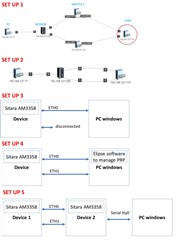Tool/software:
Hi everyone,
I am new to microprocessors, Linux and networking so I need your help for my project.
I have this device with an AM3358 processor that I would like to use as a DANP device. It has two ethernet ports and before me (around 2020) someone had already installed the kernel for HSR/PRP redundancy.
I try to set up the prp configuration through this script:
MAC=`ifconfig eth1 | grep HWaddr | awk '{print $5}'`
IP=`ifconfig eth1 2>/dev/null|awk '/inet addr:/ {print $2}'|sed 's/addr://'`
echo "Configuring new PRP network interface with address $IP MAC $MAC"
ifconfig eth0 0.0.0.0 down
ifconfig eth1 0.0.0.0 down
ip link set dev eth0 address $MAC
ip link set dev eth1 address $MAC
ifconfig eth0 up
ifconfig eth1 up
ip link add name prp0 type prp slave1 eth0 slave2 eth1
ip addr add $IP/24 dev prp0
ifconfig prp0 up
It works for some time, I connect the device eth0 to my PC and I can ping the device, same if I connect to eth1.
However the connection randomly stops working and i can't access my device anymore from my PC.
What I’ve observed is that by using tcpdump, the device receives ICMP requests and sends replies. However, the replies don’t reach my PC.
After some time, the communication resumes as if nothing happened, but the issue recurs intermittently. I’ve cheked my hardware integrity and replaced Ethernet cables.
The problem persists regardless of these changes.
Has anyone experienced a similar issue or have suggestions on how to resolve it?
Where should I look or debug further to understand the root cause of this issue?
Could this be caused by some network or kernel configuration?
Thank you for your guidance!



